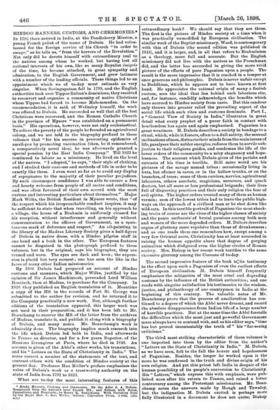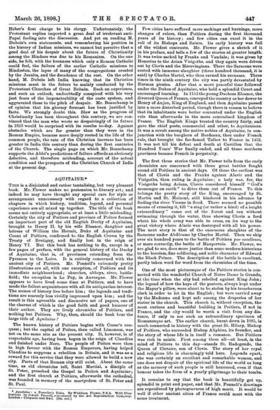HINDOO MANNERS, CUSTOMS, AND CEREMONIES.* IN 1792 there arrived in
India, at the Pondicherry Mission, a young French priest of the name of Dubois. He had volun- teered for the foreign service of his Church "in order to escape," as he tells us, "from the horrors of the Revolution."
Not only did he devote himself with extraordinary zeal to the natives among whom he worked, but having lost all national interests of his own, like so many Royalist emigres of the time, he became attached, in great sympathy and admiration, to the English Government, and grew intimate with a number of the leading officials. These things led to an appointment which we of to-day must estimate as very singular. When Seringapatam fell in 1799, and the English authorities took over Tippoo Sultan's dominions, they resolved to reconvert and organise a community of native Christians whom Tippoo had forced to become Mahommedan. On the recommendation, it is said, of Wellesley himself, the work was offered to Dubois. He succeeded so well that all the lost Christians were recovered, and the Roman Catholic Church in the province of Mysore "was established on a permanent basis." His operations, however, were not only ecclesiastical.
To relieve the poverty of the people he founded an agricultural colony, and we are told in the biography prefixed to these volumes that "for his success in preventing epidemics of small-pox by promoting vaccination (then, be it remembered, a comparatively novel idea), he was afterwards granted a special pension by the East India Company." Till 1823 he continued to labour as a missionary. He lived on the level of the natives. "I adopted," he says, "their style of clothing, and I studied their customs and methods of life in order to be exactly like them. I even went so far as to avoid any display of repugnance to the majority of their peculiar prejudices. By such circumspect confidence I was able to ensure a free and hearty welcome from people of all castes and conditions, and was often favoured of their own accord with the most curious and interesting particulars about themselves." Major Mark Wilks, the British Resident in Mysore wrote, that "of the respect which his irreproachable conduct inspires, it may be sufficient to state that when travelling, on his approach to a village, the house of a Brahmin is uniformly cleaned for his reception, without interference and generally without communication to the officers of Government, as a spon- taneous mark of deference and respect." An oil-painting in the library of the Madras Literary Society gives a half-figure -of Dubois in native dress, with a Hindoo pilgrim staff in one hand and a book in the other. The European features cannot be disguised in the photograph prefixed to these volumes, but in the original, says his biographer, they are tanned and worn. The eyes are dark and keen ; the expres- sion is placid but very earnest ; one has seen the like in the faces of many other Indian missionaries.
By 1806 Dubois had prepared an account of Hindoo customs and manners, which Major Wilks, justified by the opinion of Sir James Mackintosh, persuaded Lord William Bentinck, then at Madras, to purchase for the Company. In 1816 they published an English translation of it. Meantime a copy of the MS. in the records of Fort St. George was submitted to the author for revision, and he returned it to the Company practically a new work. Bat, although further editions of the translation appeared, this larger work was not used in their preparation, and it has been left to Mr. Beauchamp to recover the MS. of the latter from the archives of Madras, translate it, and publish it along with a biography of Dubois, and many notes. Mr. Beauchamp's work is admirably done. The biography implies much research into the life which Dubois led both in India, and afterwards in France as director, and for a few years Superior, of the Missions Etrangeres at Paris, where he died in 1848. An account is given of the Abbe's other works, his translations, and his "Letters on the State of Christianity in India." The notes correct a number of the statements of the text, and contrast others with the condition of Hindoo society at the present day. Professor Max Miiller's preface emphasises the value of Dubois's work as a trustworthy authority on the state of India from 1792 to 1823.
What are to-day the most interesting features of this
• Hindu Manners, Customs, and Ceremonies. By the Abbe J. A. Dubois. Translated from the Author's later French MS., and Edited, with Notes. Corrections, and Biography, by Henry E. Beauchamp. With Prefatory Note by the BiAht Hon. F. Mat Muller. Oxford Clarendon Press. 2 vole. (2I& net.) extraordinary book ? We should say that they are three. The first is the picture of Hindoo society at a time when it was practically unmodified by European civilisation. The similar work of the Baptist missionary, Ward, is contemporary with this of Dubois (the second edition was published in 1818), and it is larger, and, in all that refers to Brahminism as a theology, more full and accurate. But the English missionary did not live with the natives as the Frenchman did, and the latter has succeeded in giving the more vivid picture of the effects of pure Paganism upon a people. The result is the more impressive that it is reached in a temper at once generous and philosophic. Dubois is never unfair except to Buddhism, which he appears not to have known at first hand. He appreciates the rational origin of many a foolish custom, sees the ideal that lies behind each laborious rite, and, for instance, candidly acknowledges the benefits which have accrued to Hindoo society from caste. But this candour only throws into greater relief the prevailing aspect of the social life which such rites and customs dominate. Part I., a "General View of Society in India," illustrates in great detail what every prophet of a purer faith in contact with heathendom has again and again emphasised. Paganism is a great weariness. M. Dubois describes a society in bondage to a ritual, which, while it fosters, often to a dull satiety, the sensual inclinations of men, distracts their minds from the main issues of life, paralyses their nobler energies, reduces them to servile sub- jection to their religious guides, and condemns the life of the lower orders of the community to a miry stagnancy and hope- lessness. The account which Dubois gives of the pariahs and outcasts of his time is terrible. Still more weird are his pictures of the savage nomad tribes : occasionally living in huts, but oftener in caves, or in the hollow trunks, or on the branches, of trees; some of them carriers, navvies, agricultural labourers, others acrobats, magicians, sorcerers, and quack doctors, but all more or less professional brigands; their lives full of disgusting practices and their only religion the fear of evil spirits. The higher orders treated many of them as human vermin; men of the lowest tribes had to leave the public high- ways on the approach of a civilised man or be shot down like wild cats. In this terrible portrait of Paganism the most shock- ing traits of course are the vices of the higher classes of society and the panic outbursts'of brutal passions among both men and women of the more degraded orders. M. Dubois describes orgies of gluttony more repulsive than those of drunkenness ; and as one reads them one remembers how, except among a very few Oriental sects, Christianity has at least succeeded in raising the human appetite above that degree of gorging animalism which disfigured even the higher circles of Roman society. Mrs. Bishop in her recent work testifies to the same excessive gluttony among the Coreans of to-day.
The second impressive feature of the book is; its testimony to the effect upon such a Paganism of even the earliest efforts of European civilisation. M. Dubois himself frequently emphasises the mitigation of the most cruel and degrading customs by the influence of the British authorities; and one reads with singular satisfaction his testimonies to the wisdom, justice, and philanthropy of our countrymen in India at the beginning of this century. The valuable notes of Mr. Beauchamp prove that the process of amelioration has con- tinued to a degree of which the Abbe never dreamt, and record the absolute disappearance from Indian life of a large number of horrible practices. But at the same time the Abbe foretells the difficulties which the most just and powerful Government must always have to contend with, and as his editor says, "time has but proved incontestably the truth of" his "far-seeing criticisms."
The third most striking characteristic of these volumes is one imported into them by the editor from the author's "Letters on the State of Christianity in India." M. Dubois, as we have seen, felt to the full the horror and hopelessness of Paganism. Besides, the longer he worked upon it the more he was confirmed in the truth and divine origin of his own religion. And yet this priest left India in despair of the human possibility of its people's conversion to Christianity. His "Letters," which express this with emphasis, were pub- lished soon after his return to France, and raised a bitter controversy among the Protestant missionaries. Mr. Beau- champ notes the answers made by Hough and Townley, but the indignation M. Dubois excited is perhaps more fully illustrated in a document he does not quote, Bishop Heber's first charge to his clergy. Unfortunately, the Protestant replies imported a great deal of irrelevant anti- Papal feeling into the discussion. And yet on reading M. Dubois's own statements, and remembering his position in the history of Indian missions, we cannot but perceive that a good deal of his despair about the future of Christianity among the Hindoos was due to his Romanism. On the one aide, he felt, with the keenness which only a Roman Catholic could feel, the failure of- the earlier Catholic missions to Hindostan, the lapse of many of the congregations created by the Jesuits, and the decadence of the rest. On the other hand, M. Dubois left India knowing that its Christian missions must in the future be mainly conducted by the Protestant Churches of Great Britain. Such an experience, and such an outlook, undoubtedly conspired with his very just fears of the impenetrability of the caste system, and aggravated these to the pitch of despair. Mr. Beauchamp is of opinion that his gloomy forecast has been justified by facts. We strongly doubt this. Slow as the progress of Christianity has been throughout this century, we are con- vinced that the man who wrote so despairingly of its future in 1823 would be surprised with its results to-day. Against obstacles which are far greater than they were in the Roman Empire, because more deeply rooted in the life of the common people, the rate of the Christian increase has been greater in India this century than during the first centuries of the Church. The single page on which Mr. Beauchamp supports the Abbe's predictions of failure affords an obviously defective, and therefore misleading, account of the actual condition and the prospects of the Christian Church of India at the present day.







































 Previous page
Previous page